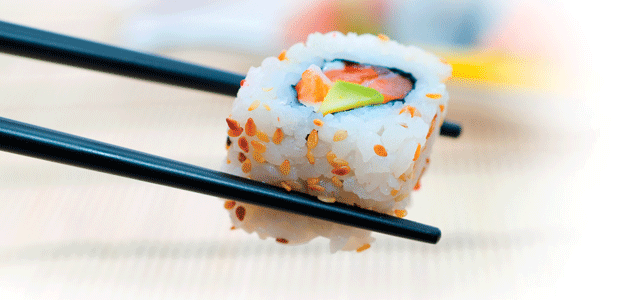Advertisement
Sushi
Can It Prevent Lung Cancer?

This year, 22,700 Canadians will be diagnosed with lung cancer. Out of these cases, 19,300 will die. While lung cancer is the most commonly diagnosed cancer in Canada, it is also the most preventable. Current research suggests that a diet rich in raw fish may provide significant protection against this fatal disease.
In Japan, where smoking rates are comparable to, if not higher than, smoking rates of people living in Western countries such as Canada, lung cancer rates are significantly lower. Researchers at the Aichi Cancer Center in Nagoya, Japan, have concluded that a possible explanation for this surprising contradiction is the large amount of sushi consumed in the traditional Japanese diet.
After observing the eating patterns of 5,885 Japanese residents over 14 years, scientists at the Aichi Cancer Center found that participants who ate large amounts of both fresh fish and shell fish (common ingredients used in sushi cookery) significantly decreased their risk of developing lung cancer, regardless of their age or gender.
Fabulous Fresh Fish
The study published in the journal of Cancer and Nutrition (2003) found evidence that the N-3 polyunsaturated fatty acids contained in fish oil can inhibit the development of human lung mucoepidermoid and other carcinomas.
Another study, published in the British Journal of Cancer (2001) found that the protective effect of a diet rich in fresh fish appeared to be the strongest against lung adenocarcinoma.
There are several different types of lung cancer–adenocarcinoma accounts for about five percent of all cases in Canada. Those who consumed fresh or raw fish appeared to cut in half their risk of developing this type of lung cancer. Decreased risk factors were also seen in those who ate boiled or broiled fish. Salted and dried fish did not appear to offer the same protective effects as raw or cooked fresh fish.
In addition to fresh fish consumption, researchers found that a diet rich in soybean curd decreased lung cancer risk in females, while raw and green vegetables, fruits, and milk decreased the risk of lung cancer in males.
Hurray for a Healthy Diet
Doug Cook, a registered dietician and nutritionist at St. Michael’s Hospital in Toronto, recognizes sushi as a healthy meal, but he believes more research needs to be done before recommending it as a proven way to prevent lung cancer. He says that the best associations between decreased lung cancer rates and diet, so far, have been seen with whole foods, fruits, and vegetables.
Cook believes a diet composed of fruits and vegetables and other foods high in antioxidants, such as green tea and soy, and a good multivitamin/mineral will provide individuals with the most protection.
Vitamins and minerals are important as they play a vital role in immune system response, and a strong immune system helps to protect against cancer. Nori, the seaweed traditionally used in sushi preparation, is a rich source of many minerals including zinc, iodine, and calcium.
The Canadian Cancer Society also acknowledges the association between diet and lung cancer prevention. The organization recommends that everyone eat a healthy diet, including five to 10 servings of fruits and vegetables, daily. They also acknowledge the link between a diet high in beta-carotene and vitamin A intake (green and yellow vegetables are good sources) and a decreased risk of lung cancer. In addition, there is some evidence that alcohol, fat, and cholesterol consumption increases risk.
The Canadian Cancer Society suggests that the best ways to prevent lung cancer are to improve your diet, reduce exposure to second-hand smoke, avoid exposure to carcinogens in the workplace, and if you smoke, quit.





